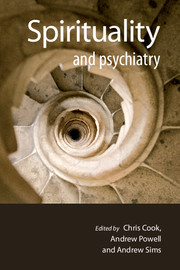Book contents
- Frontmatter
- Contents
- List of contributors
- List of tables, boxes and figures
- Foreword
- Preface
- The Spirituality and Psychiatry Special Interest Group of the Royal College of Psychiatrists
- 1 Spirituality in psychiatry
- 2 Assessing spiritual needs
- 3 Psychosis
- 4 Suicide
- 5 Child and adolescent psychiatry
- 6 Psychotherapy
- 7 Intellectual disability
- 8 Substance misuse
- 9 Neuroscience of the spirit
- 10 Spiritual care in the NHS
- 11 The transpersonal perspective
- 12 Religion and religious experiences
- 13 Pathological spirituality
- 14 Ageing
- Index
Foreword
Published online by Cambridge University Press: 02 January 2018
- Frontmatter
- Contents
- List of contributors
- List of tables, boxes and figures
- Foreword
- Preface
- The Spirituality and Psychiatry Special Interest Group of the Royal College of Psychiatrists
- 1 Spirituality in psychiatry
- 2 Assessing spiritual needs
- 3 Psychosis
- 4 Suicide
- 5 Child and adolescent psychiatry
- 6 Psychotherapy
- 7 Intellectual disability
- 8 Substance misuse
- 9 Neuroscience of the spirit
- 10 Spiritual care in the NHS
- 11 The transpersonal perspective
- 12 Religion and religious experiences
- 13 Pathological spirituality
- 14 Ageing
- Index
Summary
During my presidency I became more and more convinced of the importance of promoting mental health and well-being, alongside the treatment of mental illness. But I see mental health as the responsibility of everyone, not just health and mental health professionals. The social care, criminal justice and education sectors and faith-based organisations should all be involved in asserting the centrality of mental health in society, in contributing to the prevention of mental illness and in supporting individuals with mental disorders.
The World Health Organization report in 2004 estimated that 40–50% of mental illness could be prevented through primary intervention. Meanwhile, the World Bank has recognised the contribution of social capital (the extent to which people help each other) to the wealth and well-being of a country (Dasgupta & Serageldin, 2005). The contribution of mutual trust, wilful reciprocity of help and participation in civic society are described as three particular markers of social capital. When social capital is high, individual coping capacity increases, but when it is low, crime rates, divorce and family violence increase.
As psychiatrists we work with people with serious mental disorders, many of whom may have lost meaning and purpose in their lives. Each person's journey of recovery will seek to find new meaning and purpose, hopefully supported by friends and family who have shared values (Care Services Improvement Partnership et al, 2007). Spirituality, defined in this book in part as being ‘concerned with matters of meaning and purpose in life, truth and values’ is clearly relevant. This sharing of values and belief systems with other members of one's community and achieving a personal equilibrium seem intuitively likely to improve one's coping capacity.
I welcome this book that brings together so many excellent explorations of the difficult to measure construct of spirituality, which is yet rated by service users as a fundamental marker of a good mental health service.
I believe that acquiring the understanding and skills needed to allow our patients to express and explore their own spirituality in relation to their well-being is fundamental. However, many students and practitioners will have had little or no training in how to enquire about an individual's spirituality or religious faith.
- Type
- Chapter
- Information
- Spirituality and Psychiatry , pp. x - xiPublisher: Royal College of PsychiatristsPrint publication year: 2009

